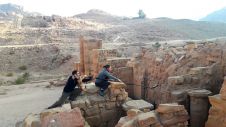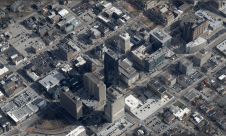Land Registration in the Arab World
Challenges and ambitions relating to the establishment of secure and reliable land registers within the Arab world were discussed during a symposium on 'Land Registration in the Arab World' held at the Marriot Jordan Valley Dead Sea Resort and Spa in Jordan from 1st to 3rd September 2005. Arab countries inherited from the Ottoman Empire and the colonial era various systems of land tenure and land registration, which developed more or less consistently. In this era of electronic information the world is witnessing a huge transformation within almost all domains. This situation requires revision of registration systems, co-operation and information and knowledge exchange. Up until now the level of such exchange of information and experience among Arab countries themselves, and with other countries, has not been satisfactory. But over recent years there has been a noticeable improvement and various activities, including seminars and meetings addressing land registration and cadastre, have taken place in some of these countries.
Significant Differences
The present symposium aimed at portraying land registration systems in Arab countries, their history, experience, challenges and future ambitions, and at sharing international experiences within the domain. The main topics were:
- international experiences
- land registration systems in Arab countries
- modern technologies applications
- future ambitions
- land management in Arabic countries.
The land registration systems within the Arab world were explored. More then 150 experts representing almost all of the Arab nations participated; discussions were lively, open and to the point. There are significant differences in the level of development of the land registration systems within the region. A country like Jordan has almost completed computerisation of its cadastral and property data and has developed tools for internet access. Other countries are still completing their registration systems and all data is on paper. In many countries existing legislation fails to cope with technology. In many cases cadastral maps are seriously damaged and there is an urgent need for computerisation; this could be combined with cadastral data collection from remote sensing imagery. Differing registration systems, such as those for rural lands and settlement areas, could be combined within unified electronic systems with e-services. Accuracy is a point of attention; in many cases there are discrepancies between the physical situation in the field and representation of this in the registration system. There is a preference for converting existing deed-based registrations to title-based registrations. International standards should be adopted to accelerate implementation of cadastral and land registry systems.
Strengthening Ties
The conference called for intensification of co-operation among concerned Arab bodies through improvement in the means of communication, participation in scientific meetings, identifying Arab experts in Land Management Cadastral Registration and Surveying, and publishing related information. It was proposed that the nations co-operate in a project to develop a unified Arabic Model for laws and regulations organising title-register modalities in Arab countries. The possibilities should be further studied of reducing the costs of land and property registration and simplifying the procedures involved. A further subject for study was unification of the different surveying and registration organisations within the same country. Another was automation of data collection and maintenance operations and storage within a modern database environment. It was recommended that the Arab Union of Surveyors extends union relationships, and examines legislation within the domain of Cadastral Registration. Other disciplines could be involved here.
Appreciation
Conference expressed its great esteem for the outstanding experience of the Department of Lands and Survey in the Hashemite Kingdom of Jordan. In particular, its remarkable achievements concerning implementation of the title register and development of surveying services, making of it a model within this domain. The participants expressed their gratitude and appreciation to his Majesty King Abdullah II, to the government of Jordan, and to the Department of Lands and Surveys for their generous hospitality and for their patronisation of the conference.

Value staying current with geomatics?
Stay on the map with our expertly curated newsletters.
We provide educational insights, industry updates, and inspiring stories to help you learn, grow, and reach your full potential in your field. Don't miss out - subscribe today and ensure you're always informed, educated, and inspired.
Choose your newsletter(s)
























